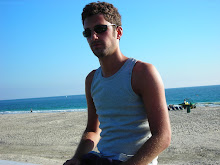"A mixed-race Sheffield native, a carrot-topped red head, and a Somali refugee walk into a bar. And everyone buys them a drink."
In the cold light of a grey morning we stumbled, bleary eyed and subdued, from our houses and apartments towards buses and trains, sidewalks and traffic jams. The metropolis, that great, sprawling, teeming mass of concrete, of Roman stone and Olympic glass, shuddered against the tide, against the swell of humanity, clogging and corroding its rivers and roads. On this morning, on this day, it was London Bawling.
Over the course of the previous two weeks a new golden age had emerged. It was not perfectly formed. Like the city - no, the country - to which it became attached, this renewed sense of confidence and community, idealism and identity, was haphazard in nature: some wore it on their sleeves, others drew it stoically across the quiet part of their hearts.
For the first time since the Second World War, those that affiliate themselves with the ethnic melting pot that is otherwise known across the globe as "Britain" were able to engage in a new sense of patriotism, of deference to a long and tumultuous past and belief - at last - in a better future. But for all our recent displays of emotion and catharsis in front of a watching world, we are creatures of habit. The fireworks will cease, the sun will go down, the train will be delayed. It was ever thus.
And yet... perhaps a new Britain has begun to emerge; not tangible enough to witness every day, not visceral or even particularly prosaic, but there: in a smile, an acknowledgment, a sense of belonging. In the Olympic stadium, as one flame was extinguished, a new candle burned faster, higher and stronger. Stoked in the embers of London 2012 and fed by common purpose, it is this country's torch of tomorrow, blazing a trail to the audacity of hope, to daring to dream.
This is, for all its pyrotechnic confidence, a silent siren, a quiet question to each and every one of us: do you now, after what we have witnessed and what we have together produced, believe in the evidence of things unseen? Do you, at the last, have faith in the substance of what is hoped for? When once the answer was "no", Britons today can look up, if not at each other then at least with each other, and say "yes". The stage was taken and these Kingdoms became United. For the first time in the modern age, this country - this Britain - became Great.
On the Metropolitan line at Baker Street on the morning of Monday 13 August 2012 none of this was particularly evident. Headphones were worn, papers were read, coughs were spluttered. We looked down. We waited patiently for trains. We checked our emails. The train was, as usual, standing room only.
One of the last to find some space was an old lady. The lines on her face were drawn and heavy: they spoke of time and its passing. I watched, hemmed in myself by sweaty hands clamouring for support as the doors swung shut on this carriage of colours and creeds, this small compartment of real London, and I saw in her a sense of wisdom. She had lived the British story: the bombast and the bombs, the empire and the emptiness, the votes and the violence, the parties and the penalties.
She did not speak. She did not need to. She simply looked around, at once both bewildered and becalmed by the close proximity of her fellow travellers. With a chiseled look of wary determination her piercing gaze rested upon a black man who must have been of a similar age to me. He sat on the seat closest to this lady of London. The sound of drum and bass forced itself out in tinny syncopation from his headphones. The black man looked up and, for the briefest of moments, met the lady's gaze.
From different parts of the world and at different stages of life, entrenched in their capital and intrinsically bound together through providence on a Tube train, they found themselves within three feet of each other: British and Londoners both.
After a pause, the black man stood up and, without a word, gestured first at the old lady and then to his now vacant seat. She nodded - a gracious bow of gratitude - and took her rightful place. The man repositioned himself and pulled his shoulders back, standing tall and proud against the huddled masses of the carriage. He noticed me watching and - swiftly, almost wistfully - he smiled. I smiled too. So did the old lady. And then we retreated, back into ourselves, back into our unspoken thoughts, our truths and our lies.
When I looked up again it was later and the train was rattling through the ancient tunnels of London: an engineering project centuries old carrying modern men to their destination. It was ever thus.
And I smiled again. This time for longer. This time for real. This time for better. The man was moving to the swerve of the train and the beat of his music. The old lady gently swayed in her seat and altered her glasses: to see more clearly the state of her nation.
He wore a dark blue t-shirt. She carried a black handbag. Both items would have been unexceptional but for one defining feature emblazoned on both: six letters that signify not just one but many generations inspired. "Team GB."
Robert 'Sammy' Samuelson
13 August 2012
London, United Kingdom

